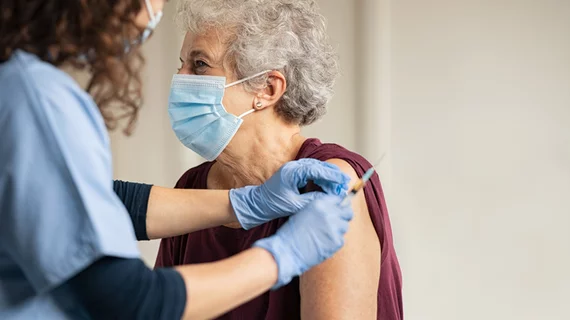New data highlights the continued importance of COVID-19 vaccines for CVD patients
A recent Cardiovascular Research study found no association between two COVID-19 vaccines—BNT162b2 and CoronaVac, both authorized for emergency use in Hong Kong—and major adverse cardiovascular events (MACE) in patients with existing cardiovascular disease.
To make the determination, researchers looked at electronic medical records and vaccination records for patients with existing cardiovascular disease who had a new MACE diagnosis between the start date of Hong Kong’s vaccination program in February 2021 and January 2022.
“Our study showed that pre-existing cardiovascular disease should not prevent people from getting vaccinated against COVID-19,” said study author Esther W. Chan, MD, of the University of Hong Kong’s Li Ka Shing Faculty of Medicine in a statement about the study.
Specifically, the researchers compared each patient’s own experience of MACE up to 27 days after each vaccine dose, considered the “exposure period,” versus their experience of MACE during the non-exposure baseline period outside of those 27 days.
In the statement, Chan explained the reasoning behind the study’s approach.
“A traditional cohort study would compare the vaccinated group with the unvaccinated group but the two groups could have different baseline characteristics. A self-controlled case series avoids the issue of differences between groups since each individual acts as his/her own control,” she said.
Estimated incidence rate ratios (IRRs) for the first dose of BNT162bt were 0.48 during the first 13 days post-vaccination and 0.40 for days 14 to 27. Incident rates for the second dose were 0.87 during the first 13 days and 1.13 for days 14 to 27.
For the first dose of CoronaVac, the IRRs were 0.43 during the first 13 days post-vaccination and 0.54 for days 14 to 27 post-vaccination. Incident rates the second dose were 0.73 for the first 13 days and 0.83 for days 14 to 27.
The results offer peace of mind for those with cardiovascular disease who have already been vaccinated, as well as encouragement for those whose health history of cardiovascular disease may have caused any hesitation.
In fact, Chan notes, those with pre-existing cardiovascular disease may be especially strong candidates for the vaccine given their higher risk of complications if they do contract COVID-19.
“Vaccination is particularly important for this group since cardiovascular disease is associated with worse outcomes and a higher risk of death after COVID-19 infection,” she said.
Reference:
1Ye X, Ma T, Blais JE, et al. Association between BNT162b2 or CoronaVac COVID-19 vaccines and major adverse cardiovascular events among individuals with cardiovascular disease. Cardiovasc Research. 2022. doi:10.1093/cvr/cvac068.
Related Content:
Congenital heart disease increases risk of poor COVID-19 outcomes, including death
COVID-19 vaccines safe for patients with a history of heart damage
VIDEO: Vaccines boosted survival among STEMI patients with COVID-19
ACC issues COVID-19 guidance for cardiologists
